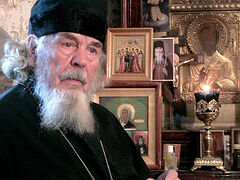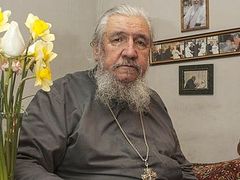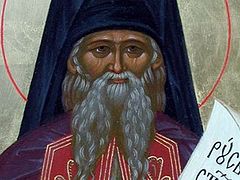Fr. Kirill Kaleda talks more about his father, the well know Fr. Gleb Kaleda, what it was like to grow up in family of a secret priest, and persecutions of the 1960s.
 The Church of the New Martyrs and Confessors of the Russian Church at the former Butovo firing range in Moscow. Photo: martyr.ru
The Church of the New Martyrs and Confessors of the Russian Church at the former Butovo firing range in Moscow. Photo: martyr.ru
—Fr. Kirill, I understand that this might be a rather seditious idea, but it is precisely in the context of the experience of the New Martyrs that much is being revealed in the present day: Why for example His Holiness Patriarch Kirill strongly urges monastics not to shut themselves up behind the monastery walls, or the clergy and laity behind the church walls. Wasn’t the experience of persecution, in a certain sense, an “apostolate” allowed by the Lord? It is known, for example, that Archimandrite John (Krestiankin) gained from his prison camp experience the opportunity to find a common language with criminals. He converted many not only in the camp but also later, in his cell. How did Fr. Gleb set out on the path of prison ministry? He wasn’t imprisoned, was he?
—No, my father was never imprisoned. He was a rather cautious person. Even some of his close friends laughed at him a little: “Well, Glebushka [a diminutive form of the name Gleb.—Trans.] is organizing a conspiracy again.” Although I doubt that they would have dared to do what my father did. And the truth was not hidden from us children, although it was dangerous.
We were aware that our grandfather Vladimir was a priest and had suffered for his faith. We prayed that the Lord would reveal the circumstances of his death to us. It was not until 1989 that we learned that he had been executed by firing squad; and only in 1994 did we learn that it had happened at the NKVD firing ground in Butovo. We children also knew about our father’s secret priesthood.
And my father began to engage in prison ministry, as he himself said, almost by chance. By the time he began to serve in the Church of the Prophet Elias at Obydensky Lane in Moscow, one of its parishioners, Sergei Khalizin, had already visited the prisons several times. Some clergy were invited to prison, but each came once and never returned. My father was invited as well. He was relatively free and didn’t refuse.
Fr. Gleb had a lot of experience working with people. He gave lectures, was a good speaker, a lively conversationalist, and he knew how to build a dialogue with an audience. But his first visit to the prison was the only time in his life when he didn’t know what he would say to people. Nevertheless, having come and established human contact with them, he managed to talk to them and became filled with compassion for them, realizing that he was needed there. So he began to visit the prisons, although there were no decrees or orders from the Church hierarchy.
 Archpriest Gleb Kaleda —What helped Fr. Gleb find a common language with prisoners?
Archpriest Gleb Kaleda —What helped Fr. Gleb find a common language with prisoners?
—Apparently, an incident at Stalingrad, when the “Not a step back” order was signed and he was almost shot, helped him understand those condemned to death. He interceded for his companion in arms. The officer started accusing his companion of something, and my father said that that wasn’t the case. “What? Kaleda, you say the officer is wrong, that he’s telling a lie?” the officer came down on Fr. Gleb like a load of bricks. “No, I didn’t say that,” my father replied. “But Malyshev [as I remember, this was his companion’s name.—Fr.K.] did not do what you’re accusing him of.” “So you’re going against a Red Army officer?!” the commander wasn’t going to calm down. And Fr. Gleb was taken to the edge of a ditch, stripped of his uniform, and a pistol muzzle was pointed at him.
When we were children, our father didn’t forbid us, his sons, to play war, and we had toy soldiers made by our older brothers. As a child, Fr. John1 made us wooden toy guns. I remember playing and aiming at someone, when my father said to me: “Never point a weapon at anyone, not even a toy one. Because you don’t know what it’s like to have the barrel of a gun pointed at you.” I didn’t understand him back then. Fr. Gleb spoke much about the war, and we loved his stories. But he once told that episode in more or less detail to our mother, and then, shortly before his repose, he told it to me. He didn’t share it anymore.
My father’s comrades later told us that only his composure had saved him. My father prayed. But when the worst was over, he couldn’t put on his uniform. His hands were shaking so much that he couldn’t get them into the sleeves. I believe that after the incident with the officer, Fr. Gleb was able to understand death row inmates.
—Soviet society, in a sense, could be understood as a synonym for a prison, a concentration camp.
—Our parents taught us to remember all the time that we are Christians. For example, in the fifth grade I was sent to a forest school for the winter season where for three months I would have to be in a non-Orthodox environment. Before my departure, realizing that I wouldn’t be able to pray openly (it was 1968 or 1969), my father exhorted me to make the sign of the cross in the evenings before going to sleep, covering myself with a blanket.
—Everyone agrees that all those Soviet trappings—the Mausoleum, stars instead of crosses, portraits of communist leaders instead of iconostases—was an anti-Christian obsession.
 Archpriest Vasily Evdokimov At the same time, the New Martyrs showed love for fierce and brutal persecutors, and people of the following generations could go into repeat offenders’ cells unaccompanied. Why do we now have an “autonomy of everyone from everyone” and atomization in society, even in the Church community?
Archpriest Vasily Evdokimov At the same time, the New Martyrs showed love for fierce and brutal persecutors, and people of the following generations could go into repeat offenders’ cells unaccompanied. Why do we now have an “autonomy of everyone from everyone” and atomization in society, even in the Church community?
—I was privileged to speak with Priest-Confessor Vasily Evdokimov († 18.12.1990). He told me: “Kiryusha [a diminutive form of the name Kirill.—Trans.], you can’t even imagine how happy life was in Russia before 1917.” “Why?” I asked. “What was so special about it?” “People trusted each other,” he replied. And now this can’t be found even within the Church community—we are really disunited.
Back in the 1990s, my father used to say that perhaps it was easier to live in the time of the New Martyrs than it is now. Even during those years of persecution, everything was clear: You were either a believer or a non-believer. Either for the sake of benefits, in order to get into a prestigious university or travel abroad, you joined the Komsomol (the Young Communist League) and the Communist Party, or you didn’t compromise your conscience and were deprived of something in life. I still have a blank application form for joining the Komsomol in my desk. In order not to join the Komsomol, we, the children of a secret priest, went to different schools so as not to draw attention to ourselves. What kind of family was it if no one was a Komsomol member? I was interested in history, but father told me, “This is an ideological sphere—this door is closed for you.” I entered the geological department. Soon they announced that they were gathering a group for practice in Germany. “Just submit an application to the Komsomol and then you’ll go.” I still stumble on it among my old papers. I’ll probably give it to a museum some day.
And now everything is blurred. And there are increasingly people not only of completely different views, but also migrants around us. Our grandfathers and fathers were able to preserve the faith in those harsh conditions. They showed us an example. And what about us? The experience of the New Martyrs and Confessors of the Russian Church is absolutely vital for us today—how they formed communities, and what was called “their own circle”. If we don’t learn to do the same, we will disappear in a non-Orthodox environment and die out.
— Fr. Kirill, what could we learn from contact with those who went through the prisons and camps?
 Maria Nikolaevna Sokolova (nun Juliana; † 16.02.1981) —Here is the story of Fr. Vasily Evdokimov. He was born before the Revolution, in 1902, in the town of Kozlov2 in Tambov province—one of Russia’s backwoods. He was subjected to persecution and arrests. He was the cell attendant of Vladyka Hieromartyr Dimitry (Dobroserdov; † 10.21.1937), who was shot in Butovo. Fr. Vasily was a spiritual son of Hieromartyr Sergei Mechev († 6.01.1942), who at the end of 1941 blessed him to marry one of St. Alexei Mechev’s spiritual daughters. At that time, Fr. Sergei was living secretly in the Yaroslavl region, somewhere near the town of Tutayev. Suddenly Fr. Sergei said, “Come to me on the feast of the Nativity of St. John the Baptist, and I will marry the two of you.” They realized that the Nativity of St. John the Baptist falls during the Apostles’ Fast [when Church weddings are not performed.—Ed.], but Fr. Sergei had given his blessing... Maria Nikolaevna Sokolova (nun Juliana; † 16.02.1981) painted an icon of the Nativity of St. John the Baptist for their wedding day... At the last minute, Fr. Sergei told them not to come as he could see that the situation was getting worse. And indeed, on the day of the Nativity of St. John the Baptist, Fr. Sergei Mechev was arrested and later executed by shooting on the Eve of the Nativity of the Lord (January 6, 1942). Tatiana, Fr. Vasily’s wife, gave me that icon later, because I was born on the feast of the Nativity of St. John the Baptist. It was Fr. Vasily who subsequently blessed the opening of the Church of St. Nicholas at Klenniki on Maroseika Street in Moscow.
Maria Nikolaevna Sokolova (nun Juliana; † 16.02.1981) —Here is the story of Fr. Vasily Evdokimov. He was born before the Revolution, in 1902, in the town of Kozlov2 in Tambov province—one of Russia’s backwoods. He was subjected to persecution and arrests. He was the cell attendant of Vladyka Hieromartyr Dimitry (Dobroserdov; † 10.21.1937), who was shot in Butovo. Fr. Vasily was a spiritual son of Hieromartyr Sergei Mechev († 6.01.1942), who at the end of 1941 blessed him to marry one of St. Alexei Mechev’s spiritual daughters. At that time, Fr. Sergei was living secretly in the Yaroslavl region, somewhere near the town of Tutayev. Suddenly Fr. Sergei said, “Come to me on the feast of the Nativity of St. John the Baptist, and I will marry the two of you.” They realized that the Nativity of St. John the Baptist falls during the Apostles’ Fast [when Church weddings are not performed.—Ed.], but Fr. Sergei had given his blessing... Maria Nikolaevna Sokolova (nun Juliana; † 16.02.1981) painted an icon of the Nativity of St. John the Baptist for their wedding day... At the last minute, Fr. Sergei told them not to come as he could see that the situation was getting worse. And indeed, on the day of the Nativity of St. John the Baptist, Fr. Sergei Mechev was arrested and later executed by shooting on the Eve of the Nativity of the Lord (January 6, 1942). Tatiana, Fr. Vasily’s wife, gave me that icon later, because I was born on the feast of the Nativity of St. John the Baptist. It was Fr. Vasily who subsequently blessed the opening of the Church of St. Nicholas at Klenniki on Maroseika Street in Moscow.
—What set those people apart from the others? What experience did they gain from all those trials?
—Now it may sound incredible, but they were all very cheerful people. They had such hard lives, but many of them just shone with joy! And we are driving ourselves into doom and gloom! Why? They truly lived a full life in Christ, were completely in the Church, realizing that this life on earth is ephemeral. Unfortunately, you can hardly find this today.
By their social status, education level and even Church ministry, they could be very different people. For example, I knew two nuns from Sergiyev Posad, one of whom was illiterate. And I knew one of the founders of the Moscow Psychiatric School—Dmitry Mikhailovich Melekhov. But they all clearly made up one Church at that time. When you saw those people, you understood that internally they were very close.
—How could you tell this?
—By their lively perception of Christ, and therefore a very joyful, grateful sense of life, in spite of any trials. In those days, even if you weren’t imprisoned, overwhelming anxiety and fear reigned in the country. And those people truly walked before the Lord! Clearly they didn’t ask for trouble, but at the right moment they could give a rebuff.
—Should believers rebuff the presumptuous?
—When a child is naughty, you can give him a smack, right? Our father told us a story from World War II. It was in the spring of 1945 in East Prussia. All was fine, but suddenly our soldiers broke into a run! The first echelon ran, and the second took off after it. And the running mass grew by several miles in fifteen minutes. They ran along the sea coast, over which a railway ran on the embankment. If Germans had seen that moving target, they would have killed everyone at once. How did the story end? The division headquarters was located six miles away from the front. Hearing the trampling, the officers came out and started shooting at the fleeing soldiers. Some fell. The rest sobered up, admitting, “Why are we running?” What else was to be done in this situation? How couldn’t the officers shoot?
 The former Butovo firing range
The former Butovo firing range
—Unpunished evil tends to go on, become impudent, get out of hand, multiply and grow. The fact that in our country all this experience of blasphemy and persecution hasn’t been comprehended and condemned by society is simply a time bomb.
—We often say that the time of the New Martyrs and Confessors was the 1920s and 1930s, perhaps partly the 1940s. And what about Khrushchev’s persecution? Externally it was completely different, but its internal essence was also demonic and suppressive. Fr. Vasily Evdokimov, when he served in Osh as the head of the Deanery of Southern Kyrgyzstan, was simply dragged around the church by his beard.
I recall that once as a boy I wasn’t taken to the Paschal night service. And in the morning, when we came to the late Liturgy, on the Prophet Elias Church there were marks of stones that had been thrown at the Paschal procession. There were such huge depressions. This was in the early 1960s, in the center of Moscow.
Not so long ago, my cousin Maria Evgenievna, Fr. Alexander Ilyashenko’s wife, said that when in the early 1960s her father served in St. Petersburg as rector of the Holy Trinity Cathedral of the St. Alexander Nevsky Lavra, before leaving for the Paschal service he would say good-bye to his wife in such a manner that everyone in the family understood that he might never return. It was the reality. Whether or not our history will repeat itself depends on our attitude towards it.
Our interview ended in the magnificent, white stone Church of the Resurrection of Christ, which embodies “the Year of the Lord” in its Paschal paintings.
—Our Lord Jesus Christ said to His disciples: “You will be witnesses of My Passion and My Resurrection” (cf. Jn. 15:27; Acts 1:8). And they went and preached His Passion and Resurrection all over the globe. Their followers, whom the Church called “witnesses” (from Greek “μάρτυς”, meaning “witness”), became martyrs, and they also testified to the Risen Savior. Likewise, the New Martyrs of our times are witnesses of the Resurrection of Christ! And the Russian Orthodox Church, which has recognized them as saints, thus testifies to its faith in the Resurrection of Christ at a time when most of the world is walking away from God!
“Faith in the Resurrection of Christ was the stone on which the New Martyrs stood and withstood,” said His Holiness Patriarch Alexei II, who blessed the consecration of the central altar table of the white stone church in Butovo in honor of the Resurrection of Christ.
Christ is Risen!



